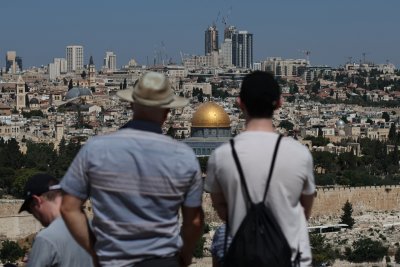
Israelis look out over a largely deserted Jerusalem on Friday, with the Dome of the Rock in the Al Aqsa compound in the foreground, after the IDF’s Home Front Command ordered people to avoid travel and stay close to air raid shelters. Photo by Atef Safadi/EPA-EFE
June 13 (UPI) — Israel said Friday morning its air defenses had successfully repelled an Iranian airborne assault in retaliation for overnight Israeli airstrikes targeting Iran’s nuclear development program.
Israel Defense Forces said Iran had launched more than 100 drones toward Israel, prompting the Home Front Command to order the public to remain close to air-raid shelters, but the warnings were later scaled back after Air Force interceptor fighter jets and anti-missile systems downed or disabled the majority.
The IDF said it was unable to confirm the threat had been completely eliminated as more UAVs could have been launched since and en route toward Israel, but that sufficient numbers had been downed to allow the Home Front Command to temporarily ease the emergency measures.
Schools, government offices and most offices were shut for the weekend, but Israeli airspace was closed and all flights grounded until further notice, with flights already en route diverted. Jordan and Iraq also closed their airspace.
However, there were fears the missiles could follow and that the drones were just the beginning of a much more significant retaliation in line with Iranian Supreme Leader Ayatollah Ali Khamenei warning Israel “should anticipate a severe punishment” in response to its deadly strikes overnight.
The Jerusalem Post reported that airstrikes by the Israeli Air Force targeting Iran’s radar systems and air defenses were still ongoing late Friday morning.
“This operation will continue for as many days as it takes to remove this threat,” Israeli Prime Minister Benjamin Netanyahu said in a statement posted on X.
He said the “Operation Rising Lion” he had ordered was a “targeted military operation to roll back the Iranian threat to Israel’s very survival” from Iran’s advancing nuclear program, which he said was close to being able to manufacture a nuclear bomb unless it was stopped.
The Iranian foreign ministry vowed Friday to hit back saying the Israeli strikes on Iran were “a blatant act of aggression in violation of the U.N. Charter.
“In accordance with Article 51 of the U.N. Charter, Iran reserves the legitimate and legal right to respond to this aggression. The Armed Forces of the Islamic Republic of Iran will not hesitate to defend Iran’s sovereignty with full strength and in the manner they deem appropriate,” the ministry said in a statement.
It also threatened the United States, alleging the attacks could not have taken place without its backing and that as Israel’s “primary patron,” the U.S. government would “also bear responsibility for the dangerous repercussions of the Zionist regime’s reckless actions.”
Internationally, leaders have appealed for calm.
U.S. President Trump, who confirmed he was notified of the strikes in advance but that the United States was not involved, said he hoped that U.S.-Iran negotiations on Tehran’s nuclear program could continue.
“Iran cannot have a nuclear bomb, and we are hoping to get back to the negotiating table. We will see. There are several people in leadership in Iran that will not be coming back,” Trump told Fox News.
The independent London-based Iran International news outlet reported on X that Aladdin Boroujerdi, a member of the Iranian parliament’s National Security and Foreign Policy Commission, saying a sixth round of nuclear talks in Oman scheduled for Sunday would now not go ahead.
European Commission President Ursula von der Leyen expressed “deep alarm” and called for restraint, de-escalation and for military forces on all sides to stand down.
“A diplomatic resolution is now more urgent than ever, for the sake of the region’s stability and global security,’ she wrote on social media.
NATO Secretary-General Mark Rutte, speaking in Stockholm, told reporters it was critical that Israel’s allies stepped in to de-escalate the crisis.
“I think that is now the first order of the day,” he said.
International Atomic Energy Agency Director General Rafael Grossi told the U.N nuclear watchdog’s board which is meeting in Vienna, that nuclear facilities must never be attacked under any circumstances due to the risk to people and the environment.
“Such attacks have serious implications for nuclear safety, security and safeguards, as well as regional and international peace and security,” Grossi warned, noting that the IAEA has repeatedly stated that military strikes on nuclear facilities could result in radioactive releases that would not be contained within international borders.
“I call on all parties to exercise maximum restraint to avoid further escalation. I reiterate that any military action that jeopardizes the safety and security of nuclear facilities risks grave consequences for the people of Iran, the region, and beyond,” he said.